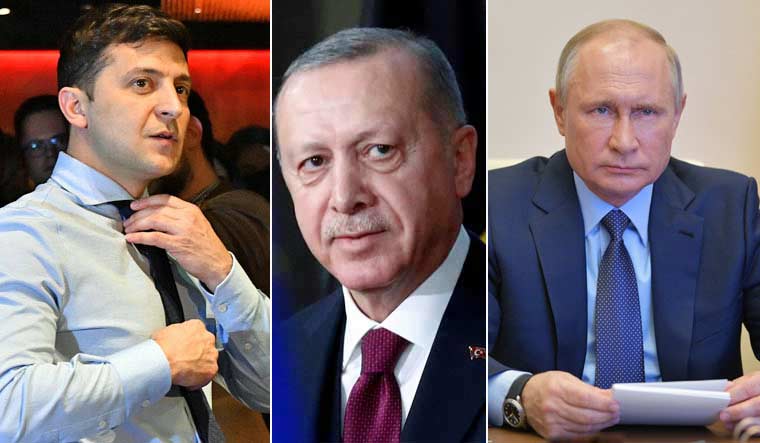Tensions in Eastern Ukraine are near the boiling point, with Russia having amassed more forces near the border than at any time since 2014, and Ukrainian President Vladimir Zelensky visiting the frontlines to assess the situation in person.
Following reports that the US was considering sending its warships to the Black Sea in the coming weeks in a show of support for Ukraine, through the straits controlled by NATO ally Turkey, Turkish President Recep Erdogan has spoken to Russian leader Vladimir Putin by telephone to discuss the growing crisis.
A Turkish Foreign Ministry official said Friday that the United States has notified Turkey that two U.S. warships will travel to the Black Sea and stay there until May 4.
The official, speaking on condition of anonymity in line with government rules. said the U.S. notified Turkey 15 days prior to the ships' passage in line with a convention regulating shipping through the Turkish straits.
Such visits by the U.S. and other NATO ships have vexed Moscow, which long has bristled at Ukraine's efforts to build up defence ties with the West and its aspirations to eventually join NATO.
Both Erdogan and Putin discussed the situation, with Putin urging Erdogan to preserve the Montreux Convention limiting the freedom of military ships to transit through the straits to the Back Sea. Putin accused Ukraine of “dangerous provocative actions” in the eastern Donbass region.
The talks between the Russian and Turkish leaders come a day before Zelensky is due to visit Istanbul for the ninth meeting of the Turkey-Ukraine High-Level Strategic Cooperation Council.
During a call with Putin on Thursday, German Chancellor Angela Merkel called for the removal of these troop reinforcements in order to achieve a de-escalation of the situation. Germany’s involvement also comes on account of its planned Nord Stream 2 gas pipeline with Russia, a project the US has opposed and one Ukraine says will “irreparably” weaken the country, as it would bypass the need for Ukraine’s own gas supply.
The Kremlin said Friday it fears the resumption of full-scale fighting in eastern Ukraine and could take steps to protect civilians there.
The statement by Russian President Vladimir Putin's spokesman, Dmitry Peskov, reflected the Kremlin's determination to prevent Ukraine from using force to try to reclaim control over separatist-controlled territory in the country's east.
Ukrainian forces and Russia-backed separatists have been fighting in eastern Ukraine since shortly after Moscow's 2014 annexation of Ukraine's Crimea Peninsula. More than 14,000 people have died in the conflict, and efforts to negotiate a political settlement have stalled.
Officials in Ukraine and in the West have raised concerns in recent weeks about increasingly frequent cease-fire violations in the country's industrial heartland, known as Donbass.
White House press secretary Jen Psaki said Thursday that the U.S. is also increasingly worried about the troop build-up, noting that Russia now has more troops on the border with Ukraine than at any time since 2014.
In response to those statements, Peskov said Russia is free to deploy its troops wherever it wants on its territory. He accused the Ukrainian military of an escalation of provocative actions along the line of control in the east that threatens Russia's security.
The Kremlin has fears that a civil war could resume in Ukraine, and if a civil war, a full-scale military action resumes near our borders that would threaten the Russian Federation's security, Peskov said. The ongoing escalation of tensions is quite unprecedented.
Dmitry Kozak, a Putin aide who serves as Russia's top negotiator with Kyiv, warned Ukraine on Thursday against using force to retake control of the east, saying such a move would mark the beginning of an end for Ukraine.
Kozak said Russia would likely act to protect civilians if they faced a potential massacre like the one that took place during the Bosnian War in Srebrenica in 1995. Asked about Kozak's comment, Peskov said that in the case of a Srebrenica-like threat, all countries, including Russia, will take steps to prevent such tragedies.
He alleged that that virulent nationalist rhetoric in Ukraine was inflaming hatred against the mostly Russian-speaking population of the east.
With inputs from PTI











